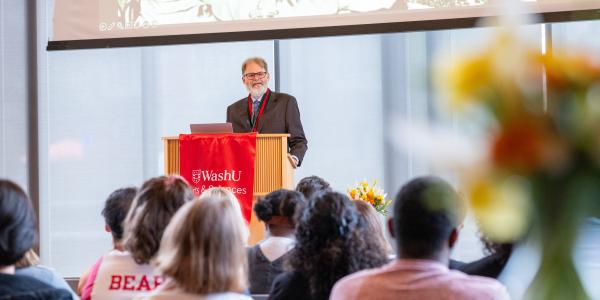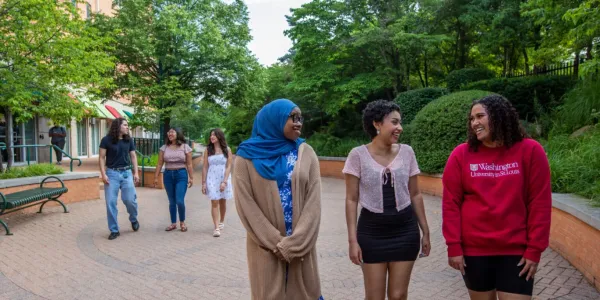During his installation ceremony on Sept. 24, 2025, Kenneth “Andy” Andrews, the Tileston Professor of Arts & Sciences, delivered an address titled “How Movements Matter.”

Kenneth T. (Andy) Andrews was installed as the Tileston Professor of Arts & Sciences on Sept. 24. The program included a welcome from Feng Sheng Hu, the Richard G. Engelsmann Dean of Arts & Sciences and Lucille P. Markey Distinguished Professor; remarks from Jake Rosenfeld, professor and chair of sociology; and the installation and medallion ceremony by Dean Hu.
In his remarks, titled “How Movements Matter,” Andrews discussed his work on the science behind the impact of social movements, including the Civil Rights Movement in the U.S. South.
“I have come to understand that the impacts of social movements are uneven, partial, fragmentary, and always contested,” Andrews said. “Some impacts may be short-lived and symbolic. Others may be more enduring and meaningful, and even these may be reversed or undermined at later points. The challenge is to understand the complexity of a movement's legacy and why some changes turn out to be more impactful and durable than others.”
Hu praised the depth and timeliness of Andrews’ world-class research. “Andy has a way of understanding social movements and protest activity that sets him apart from his peers,” Hu said. “His sharp, analytical approach gets at the heart of key issues facing our world today.”
About Kenneth “Andy” Andrews
Kenneth T. Andrews is the Tileston Professor in the Department of Sociology at WashU. Andrews graduated from Millsaps College in 1990 and earned both a master’s and PhD in sociology at the State University of New York at Stony Brook in 1993 and 1997. He began his career at Harvard University before moving to the University of North Carolina at Chapel Hill in 2003. In his 20 years on the faculty at UNC, Andrews served as chair of the Department of Sociology for eight years and held the Carl W. Ernst Distinguished Professorship.
Andrews studies the dynamics of protest and the influence of social movements on politics, media, and social change, and is interested in how relatively powerless groups sometimes propel significant changes in society. He has approached these topics using a wide range of methodologies and by studying numerous historical and contemporary movements, including writing extensively on the development and legacy of the Civil Rights Movement in the South. In his early work in this area, Andrews showed that key gains of the movement in electoral politics and social policies hinged on building local leadership, mobilizing new resources, and establishing organizations to challenge inequalities and address community needs.
Building on his finding that leaders and organizations were critical to a movement’s impact and legacy, Andrews led studies of local environmental leaders and groups. In this work, he and his collaborators found that groups that work interdependently and include leaders of diverse skills and backgrounds had greater impact. In related research, Andrews showed that movement groups face significant barriers to sharing their message. He found that news media selectively report on a very small subset of groups and issues, distorting the broader representation of the movement.
In recent years, Andrews has pursued projects studying contemporary protest movements, including Black Lives Matter, the resistance to the Trump administration, and contemporary activism on college campuses. This work has been motivated by the puzzle that, despite massive waves of protest and activism, many contemporary movements have had modest social and political impact.
Andrews’ scholarship has been supported by grants from the National Science Foundation and the Russell Sage Foundation. Andrews was a Phi Beta Kappa visiting scholar in 2023-24, and he has held visiting fellowships at the University of Oxford, Fudan University, Wissenschaftszentrum Berlin für Sozialforschung, and the Russell Sage Foundation.
Andrews joined WashU’s Department of Sociology in 2023.
About Mary Tileston Hemenway
The WashU Board of Directors created the Tileston Professorship at a special meeting on June 17, 1864, to express appreciation to Mary Tileston Hemenway of Boston and her sisters. On the occasion, Mrs. Hemenway promised a contribution of $25,000 to the Endowment Fund of Washington University. Mary Tileston Hemenway was one of the daughters of Thomas Tileston, a prominent New York banker. She was an active, involved philanthropist who supported historic preservation in Boston. Access to education was especially important to Hemenway, especially after the Civil War. She funded the construction of schools in North Carolina and Virginia and financially supported schools for Black Americans in other parts of the South, including the Tuskegee Institute, founded by Booker T. Washington in Alabama.
She was also responsible for underwriting a major archaeological expedition that helped establish the Southwest as a distinct cultural region and contributed to the professionalization of the field of archaeology.
Mrs. Hemenway was a longtime acquaintance of WashU co-founder William Greenleaf Eliot. Her gift in 1864 and her other gifts to the university proved to be, as Eliot said, “the turning point of our progress and success.”





